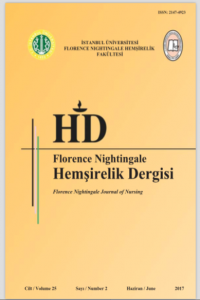Simülasyonla Eğitimde Kullanılan “Öğrenci Memnuniyeti ve Öğrenmede Kendine Güven Ölçeği”nin Türkçeye Uyarlanması
Abstract
Amaç: Çalışma, Ulusal Hemşirelik Birliği (NLN) tarafından yayınlanan “Öğrenci Memnuniyeti ve Öğrenmede Kendine Güven Ölçeği”nin Türkçe formunun geçerlik ve güvenirliğini incelemek amacı ile gerçekleştirildi.
Yöntem: Metodolojik araştırma tipinde planlanan çalışma iki aşamada gerçekleştirildi. Birinci aşamada, ölçeğin dil eşdeğerliği çeviri-geri çeviri teknikleri kullanılarak yapıldı. Kapsam geçerliğini değerlendirmek üzere simülasyon konusunda uzman öğretim elemanının görüşüne sunuldu ve alınan uzman görüşleri Kapsam Geçerlik İndeksi ile değerlendirildi. İkinci aşamada, ölçeğin güvenirliği değerlendirildi. Bu aşama, Haziran-Kasım 2015 tarihleri arasında bir hemşirelik yüksekokulunda simülasyonla eğitim gören, çalışmaya katılmaya gönüllü, 120 öğrenci ile gerçekleştirildi. Ölçeğin zamana göre değişmezliği, Cronbach Alfa katsayısı ve madde analizi ile güvenirliği değerlendirildi. Yapı geçerliği için doğrulayıcı faktör analizi yapıldı.
Bulgular: Ölçeğin Türkçe formunun kapsam geçerliği uygundu (KGİ=0.87). Modifikasyon sonrası modelin iyi bir uyuma sahip olduğu saptandı. Ölçeğin Cronbach’s Alpha katsayısı 0.88 olarak bulundu. Ölçekten 13. madde çıkarıldığında Cronbach’s Alpha katsayısı 0.90’a yükseldi. Ölçeğin test-tekrar test yöntemiyle elde edilen genel toplam puanlarının sınıf içi korelasyon katsayısı (ICC) 0.50 olarak bulundu.
Sonuç: Öğrenci Memnuniyeti ve Öğrenmede Kendine Güven Ölçeği’nin Türkçe formunun ülkemizde hemşirelik uygulama ve araştırmalarında kullanılabilecek geçerli ve güvenilir bir araç olduğu saptandı.
Anahtar Kelimeler: Simülasyon, öğrenci memnuniyeti, kendine güven, ölçek geçerlik ve güvenirliği.
The Turkish Adaptation of the Student Satisfaction and Self-Confidence in Learning Scale Used in Simulation Education
Abstract
Aim: The aim of this study is to determine the reliability and validity of the Turkish version of the “Student Satisfaction and Self Confidence in Learning” scale published by the National League for Nursing.
Method: This methodological study was conducted in two stages. In the first stage, the language adaptation of the scale to Turkish was performed via back-translation. To evaluate content validity, the scale was reviewed by nursing faculty members who were experts in simulation education. The content validity index was calculated based on these experts’ opinions. In the second stage, the reliability of the scale was evaluated. From June to November 2015, 120 nursing students who had previous experience with simulation volunteered to participate in the study. At this stage, test-retest reliability, Cronbach’s alpha coefficient and item-total correlations were evaluated. The construct validity of the scale was done using confirmatory factor analysis.
Results: The content validity index of the Turkish version of the scale was appropriate (CVI= 0.87). After modification, it was found that the model was a good fit. Cronbach’s Alpha coefficient was 0.88. Removal of item 13 would have improved alpha to 0.90. test-retest intraclass correlation coefficient was 0.50.
Conclusion: The results of this study determined that the Turkish version of the “Student Satisfaction and Self Confidence in Learning Scale” was valid and reliable and could be used in nursing research and practice in Turkey.
Keywords: Simulation, student satisfaction, self-confidence, scale reliability and validity
Details
| Journal Section | Reserch Papers |
|---|---|
| Authors | |
| Publication Date | July 19, 2017 |
| Published in Issue | Year 2017 Volume: 25 Issue: 2 |


